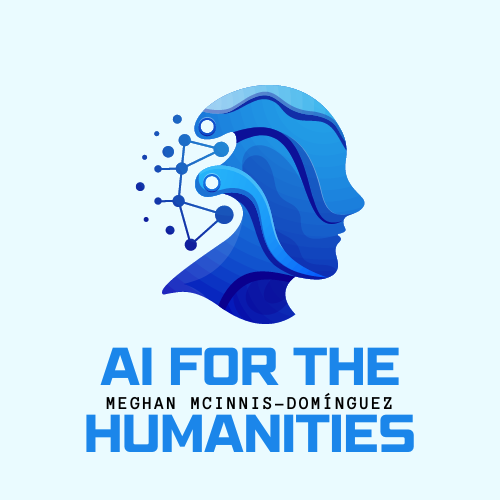Episode 24
In the latest video of AI for the Humanities, intern Dylan Manin demos Runway AI's video generation capabilities for a Humanities audience. The short demo gives educators an idea of how video generation technology might be integrated into the classroom.
Episode 23
In this episode of News in AI for the Humanities, I unpack the latest developments shaping the AI landscape from the past month and how it relates to Humanities education and research.
Episode 22
In this episode of AI for the Humanities, intern Victoria Pizzurro explores Meta’s Llama 3.2, a versatile AI model for research, writing, and translation in the humanities.
Episode 21
n this episode of AI for the Humanities, Meghan McInnis-Domínguez, Associate Professor of Spanish at the University of Delaware, introduces Zoe Rawheiser, an intern studying Perplexity AI. Zoe demonstrates how Perplexity’s specialized features—Pro Search, Focus modes, and Spaces—can be tailored for humanities research and academic collaboration.
Episode 20
In this episode of AI for the Humanities, host Meghan McInnis-Domínguez, Associate Professor of Spanish at the University of Delaware, welcomes her intern, Rebecca Gómes—an International Relations and Spanish Studies Major—to discuss the art of crafting effective prompts for Large Language Models.
Episode 19
Join Dr. Meghan McInnis-Domínguez from Buenos Aires as she examines how today's AI breakthroughs intersect with classical humanities thought. The episode examines Gemini 2's multimodal capabilities, ChatGPT's new sensory features, OpenAI's o3 reasoning model, the Veo 2 vs. Sora video generation showdown, Microsoft's Copilot Vision, Aurora's image generation on X, the Google-OpenAI rivalry, and Anthropic's alignment study.
Episode 18
In this episode, intern Zoe Rawheiser explores Perplexity AI, an innovative AI-powered search engine that transforms research in the humanities by synthesizing real-time internet searches into concise, citation-backed summaries. With tools like academic focus modes, multimodal capabilities, and Pro Search features leveraging advanced models like GPT-4, it enhances accessibility to scholarly resources and streamlines complex research workflows.
Episode 17
In the latest episode in AI News for the Humanities, I examine major innovations from leading tech companies, including OpenAI's o1 Reasoning Model and Sora text-to-video generator, Meta's Llama 3.3 70B, and Google's Gemini 2.0.
Episode 16
This episode explores Google’s NotebookLM which combine the depth of human expertise with the precision of AI, enabling educators to transform complex texts into interactive, multimodal resources.
Episode 15
In this episode of News in AI for the Humanities, Meghan McInnis-Domínguez, Associate Professor at the University of Delaware, examines groundbreaking advancements in AI voice technology, creative tools, and memory features, focusing on their potential to transform humanities research and education.
Episode 14
"In our latest 'AI for the Humanities' episode, Victoria Pizurro (MechE major, CS, Math & Spanish minor) introduces Meta's Llama 3.1 & 3.2. We explore Llama's evolution, its role in social media, and prompt engineering.
Episode 13
Latest AI for the Humanities video by my student, Rebecca Gomes, on the basics of ChatGPT 4o.
Episode 12
Anthropic's Claude 3.5 Sonnet "New" with computer use, OpenAI's search updates, and Perplexity's research tools, Google's Project Jarvis, Disney's AI-driven creativity, and uncertainties around the US AI Safety Institute
Episode 11
AI for the Humanities YouTube interview with Dr. Malkiel Choseed about how I use AI with writing assignments
Episode 10
You really need to know more about NotebookLM if you haven't already heard about it. It is a game changer and it is free (for now)
Episode 09
News in AI for the Humanities--ChatGPT's Advanced Voice Mode, Meta's Llama 3.2, CA Governer's AI Veto, and OpenAI's move to for-profit corp.
Episode 08
In this episode of AI for the Humanities, Meghan McInnis-Domínguez, Associate Professor of Spanish at the University of Delaware, explores the innovative applications of ChatGPT's new voice chat function for humanities education. She introduces several creative uses for this technology in the classroom, including character interviews, author dialogues, interactive storytelling, and language practice.
Episode 07
In this episode of "AI for the Humanities," host Meghan McInnis-Domínguez, Associate Professor of Spanish at the University of Delaware, introduces a group of undergraduate interns exploring the potential of Generative AI in humanities education. Each intern will become an expert in a specific AI tool, creating videos and contributing to a guidebook for educators. In a roundtable discussion, the interns share their diverse perspectives—ranging from newcomers to those with previous experience—on the benefits and challenges of integrating AI into the classroom.
Episode 06
In the latest episode of "AI for the Humanities," Meghan McInnis-Domínguez, Associate Professor of Spanish at the University of Delaware, discusses recent AI advancements and their relevance to humanities education and research. Key topics include OpenAI’s o1 model series, which offers enhanced reasoning capabilities ideal for complex tasks like philosophical reasoning and textual analysis, as well as Safe Superintelligence (SSI), a new AI safety startup, and government partnerships focused on AI safety protocols. The episode also highlights creative AI tools like Google’s Imagen 3 and Runway’s Gen-3 Alpha, exploring their potential to transform digital humanities projects.
Episode 05
In this episode of "AI for the Humanities," Meghan McInnis-Domínguez, an Associate Professor of Spanish at the University of Delaware, delves into the essential vocabulary of generative AI. Recognizing the growing intersection between AI and the humanities, she emphasizes the importance of understanding key concepts such as Natural Language Processing (NLP), Machine Learning (ML), Large Language Models (LLMs), AI Assistants, and Chatbots.




















